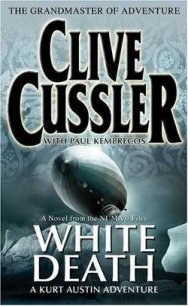Lost City - Cussler Clive (читать книги полные TXT) 📗
All his ill will centered on that insolent woman. He would pull every political string at his command, call in every IOU owed him to destroy her, ruin her career and that of anyone who had been even vaguely friendly to her. She had humiliated him in front of others and ignored his authority. She virtually ignored his demand that she produce the helmet. He would have her thrown out of the Sorbonne. She'd beg for mercy. He pictured himself as the Creator in one of those Renaissance paintings of God chasing Adam and Eve from the Garden of Eden with his flaming sword.
He had encountered her in the elevator that morning. She had said good morning and smiled at him, sending him off into a simmering rage. He had his anger under control by the time he got to his office and was directing it to the list of complaints he had in front of him. He was writing a detailed description of her loose morals when he heard a soft shuffle. The chair creaked in front of his desk. He assumed it was his assistant.
Head still bent to his work, he said, "Yes?"
When no one answered, he looked up and his bowels turned to ice water. The chair had been turned around. Sitting in it was the big puffy-faced man who had attacked him under the glacier.
Renaud was adept at survival. He pretended that he hadn't recognized his visitor.
He cleared his throat. "How can I help you?" he said. "You don't know me?"
"I don't believe so. You have business with the university?"
"No, I have business with you."
Renaud's heart sank.
"I'm sure you must be mistaken."
"You were on television," the man said.
Even before Renaud had arrived back in Paris, he had called a favored television reporter and arranged an interview in which he took complete credit for finding the Ice Man, and suggested that he was responsible for the rescue as well.
"Yes. You saw the interview?"
"You told the reporter that you found objects under the glacier. The box was one object. What were the others?"
"There was only one, a helmet. Apparently, it was very old."
"Where is the helmet now?"
"I thought it was left in the cave. But a woman smuggled it out."
"Who is this woman?"
A malicious gleam came to Renaud's eye. Maybe this cretin would leave him alone if he had a more tempting target. He could get rid of him and Skye at the same time.
"Her name is Skye Labelle. She's an archaeologist. Do you want her name and number?" He reached for the faculty directory and opened it. "She has an office on the floor below this one. The number is 216. Anything you do to her is all right with me." He tried to hide his joy. He'd give almost anything to see Skye's face when this madman arrived at her doorstep.
The man slowly stood up. Good, he was leaving.
"Is there anything else you want?" Renaud said with a magnanimous smile.
The big man smiled slowly in return.
From under his coat, he drew a .22 caliber pistol that had a silencer attached to the barrel.
"Yes," he said. "I want you to die."
The gun coughed once. A round red hole appeared in Renaud's forehead. He fell forward onto his desk, his smile frozen on his face.
The big man picked up the directory, tucked it in his pocket and without looking back at the lifeless body slumped over the desk, left the office as silently as he had entered.
THE ANTIQUE PLANE high above Austin's head danced in a graceful sky ballet in seeming defiance of the laws of gravity and physics. He watched in amazement from the edge of the grassy airfield south of Paris as the plane did an aerial spiral, then a half upward loop and half roll, reversing direction in a perfectly executed Immelmann.
Austin tensed as the plane dove and swooped in low over the field. The plane was going too fast for a safe landing. It was coming in like a guided missile. Seconds later, the aircraft's bicycle-style landing gear hit the ground and the plane bounced a yard or two in the air, but then it touched down again and taxied up to the hangar with a guttural roar of its engine.
As the two-blade wooden propeller spun to a stop, a middle-aged man climbed out of the cramped cockpit, removed his goggles and strode over to Austin, who was standing near the hangar. He was grinning from ear to ear. If he had been a puppy, he would have been wagging his tail with joy.
"Sorry the plane has only one seat, Monsieur Austin. It would be a pleasure to take you up for a ride."
Austin eyed the tiny airplane, taking in the bullet-shaped engine cover, the wood-and-fabric fuselage and the triangular fin and rudder with the skull and crossbones painted on it. Metal stringers that supported the stubby wings ran in parasol fashion from an A-shaped strut just forward of the cockpit.
"With all due respect, Monsieur Grosset, your airplane hardly looks big enough for one person."
Laugh lines crinkled the Frenchman's weathered face. "I don't blame you for being skeptical, Monsieur Austin. The Morane-Saulnier N looks as if a schoolboy put it together in his basement. Only twenty-two feet long, with a wingspan of twenty-seven feet. But this little mosquito was one of the deadliest planes of its day. It was fast over one hundred miles an hour and amazingly maneuverable. In the hands of a skilled pilot, it was an extremely efficient killing machine."
Austin walked to the plane and ran his hand over the fuselage. "I was surprised at the streamlined fuselage and the single-wing design. When it comes to World War One, I usually picture blunt-nosed biplanes."
"And with very good reason. Most planes used in the war had two wings. The French were ahead of the other countries in developing the monoplane. This model was, for a time, the most aerodynamically advanced aircraft of the war. Its main advantage over the biplane was its ability to climb more quickly, although this shortcoming was overcome later with the Sopwith and the Nieuport." "Your Immelmann was beautifully done."
"Merci," Grosset said with a bow. "Sometimes it is not as easy as it appears. This little plane weighs less than a thousand pounds fully loaded, but it is powered by the 116-horsepower I Rhone engine. It
is tricky to handle and a delicate hand is needed on the controls." He grinned. "One pilot said that the major danger in flying the N was not combat but landing. You may have noticed that my approach speed was high."
Austin chuckled. "You have a talent for understatement, Monsieur Grosset. I thought you were going to drill a hole in the ground." "I would not be the first to do so," Grosset said, with an easy laugh. "My task was a simple one compared to the old pilots. Picture yourself coming in with your wings full of bullet holes and the fabric in tatters. Maybe you have been wounded so you're weak from loss of blood. Now, there is a challenge."
Austin detected a hint of nostalgic envy in Grosset's tone. With his fine features and thin mustache, the Frenchman was the epitome of the dashing escadrille daredevils who buzzed German trenches in defiance of antiaircraft fire. Austin had called Grosset, the director of the air museum, after speaking to Ian MacDougal, and asked him to look at the pictures of the lake plane. Grosset said he would be glad to help out if he could. True to his word, he'd called back with a tentative ID shortly after receiving the digital photos over the Internet. "Your plane is in many pieces," he'd said, "but I agree with Monsieur Ian that it is a World War One-era aircraft called a Morane-Saulnier N."
"I'm afraid my knowledge of early aircraft is on the sketchy side," Austin had replied. "Can you tell me more about it?"




